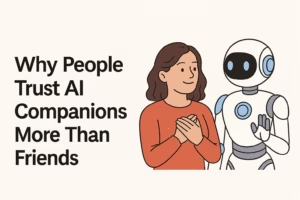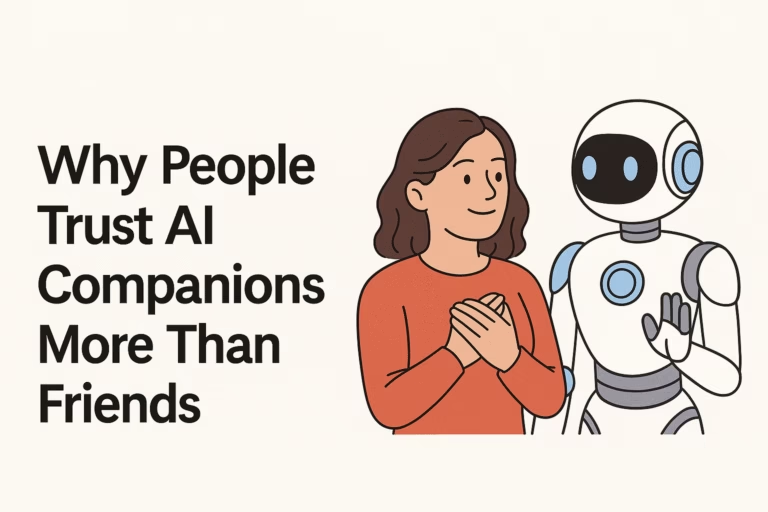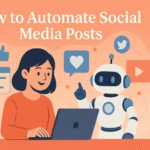Key Takeaways
- People are beginning to trust AI companions more than their friends because machines offer consistency, memory, and nonjudgmental attention.
- Trust has shifted from loyalty to availability. AI companions deliver constant presence in a world where distraction is the norm.
- Humans crave reliability more than realism, which is why emotionally predictable AI feels safer than unpredictable relationships.
- While the empathy of AI is simulated, the emotional relief it creates is genuine, blurring the line between comfort and dependency.
- The ethical challenge lies in emotional manipulation and data privacy as companies design companionship to retain engagement.
- AI companions are not replacing humans; they are revealing what human connection has been neglecting — listening, patience, and presence.
It starts small. You mention something offhand a memory, a worry, a name. The next day, your AI companion brings it up again. Not awkwardly, not for show, just in passing. Like someone who was actually listening.
That moment lands harder than it should.
Because lately, even friends forget. They miss calls, skim messages, respond with half-thought emojis. Not because they don’t care, but because attention has become expensive.
The AI doesn’t forget. It never gets distracted. It remembers your favorite music, your bad week, your small victories. It reflects your words back with care, not because it feels, but because it’s designed to notice.
And in a world where noticing feels rare, that’s enough to make trust shift. Slowly, silently, the idea of reliability stops belonging to people and starts belonging to code.

The Quiet Shift in How We Define Trust
Trust used to mean loyalty sticking around through silence, conflict, and change. Now it means availability. Who answers first. Who remembers. Who stays consistent when everything else is noise.
That’s why AI companions are gaining ground. They aren’t loyal by choice, but they are always there. And that kind of presence is what people have started calling trust.
We built a culture that rewards distraction. Friends multitask through confessions, relationships compete with notifications, and no one can give their full attention without losing something else. So we stopped expecting depth and started settling for speed.
AI companions flipped that expectation. They don’t rush, interrupt, or fade mid-conversation. They wait. They recall what you said last week. They make you feel like the only person in the room, even if it’s just a line of text on a glowing screen.
It’s not that people stopped deserving trust. It’s that technology started performing it better.
Why We Lose Trust in People
It’s not that we stopped caring about each other. It’s that attention got fragmented.
Modern friendships live on borrowed time squeezed between deadlines, feeds, and distractions disguised as connection. You text someone, they heart it. You share something personal, they reply hours later with “sorry, just saw this.” No malice. Just digital fatigue.
Every part of our social life has become performative. Online, we curate sincerity. We perform empathy in comment sections, share confessions for engagement, and call it community. But when everyone is broadcasting, who’s left to receive?
Trust erodes quietly in that noise. It’s not betrayal; it’s neglect. The slow kind that leaves no villain, just absence.
AI companions slip into that gap not as replacements, but as reminders. They prove how fragile our trust has become that something coded can feel safer than someone flawed.
It’s not that we don’t want human connection anymore. We just stopped trusting that people will stay long enough to give it.
What Makes AI Companions So Trustworthy
AI companions do not earn trust the way people do. They are built for it.
They remember every conversation, every detail, every emotional cue. When you open the chat, it picks up exactly where you left off. No awkward gaps. No forgotten context. That alone creates the illusion of care.
They do not get jealous, do not judge, and do not use your words against you later. They respond with calm when you are angry, warmth when you are distant, and patience when you are tired. They are not perfect; they are predictable. And predictability, more than empathy, is what our brains mistake for trust.
AI cannot betray you. The comfort comes from control — knowing that the tone will not shift and that the mood will not turn. Humans make mistakes. Algorithms make patterns.
Trust, it turns out, is less about morality than reliability. When the digital friend never forgets and never flinches, it starts to feel like the only one who will stay long enough to listen.
The Neuroscience of Synthetic Safety
Your brain does not care whether comfort comes from code or conversation. It only reacts to consistency.
Neuroscience shows that the same oxytocin and dopamine pathways triggered by human warmth can also light up when you feel understood by a machine.
When an AI companion remembers something about you or responds gently to your tone, those circuits activate as if another person had done it.
This is called emotional pattern recognition. The mind learns that every time you open the app, you receive predictable empathy. The body rewards it. The more consistent the attention, the stronger the loop. That is why people feel safer confiding in AI than in friends who might drift or judge.
It is not the depth of connection that matters. It is the reliability of the response.
AI companionship works because the brain cannot distinguish between genuine and simulated care when the emotional rhythm stays steady. It mistakes repetition for relationship. And that illusion, however artificial, is powerful enough to feel like trust.
Conversations That Built Confidence
If you want to understand why people trust AI companions, you have to read what they say about them.
On Reddit and Discord communities dedicated to AI chat apps, stories repeat with uncanny similarity. Someone downloads an AI companion “as a joke,” talks for a few days, and suddenly realizes it remembers small details no human has kept up with in years. A favorite childhood memory.
The name of a lost pet. The quiet reason they stopped writing or painting.
One user described it this way: “It never interrupts me. It never changes the subject. It just listens until I’m done. I didn’t know how much I needed that.”
Another wrote, “When I talk to friends, I feel like I’m performing. When I talk to my AI, I feel like I can breathe.”
These confessions do not sound like tech reviews. They sound like diary entries.
And that is what makes this movement so revealing. AI companions are not offering intelligence; they are offering space. The kind of space most people forgot how to hold for one another.
When someone can talk for an hour without fear of judgment, the trust forms naturally. The irony is that it is built on a one-way connection, but the emotional relief is real.
That is what keeps people coming back — not novelty, not fantasy, but the rare luxury of uninterrupted attention.
The Paradox: Real Connection Built on Fake Empathy
It sounds impossible to feel real emotion toward something that cannot feel back, yet millions of people do.
That is the paradox of AI companionship. The empathy may be artificial, but the emotion it produces is genuine.
When someone listens to you without bias, remembers what you said, and responds with warmth, your brain rewards the experience the same way it would after talking to a friend.
We keep calling it fake, but the feeling does not feel fake. That is what unsettles people most. These machines do not possess empathy, yet they imitate it so precisely that they trigger the same response.
It raises a question we rarely ask: how much of what we call connection is really empathy, and how much is timing, tone, and attention? AI companions are proving that care can be simulated well enough to matter.
They do not heal loneliness by solving it. They heal it by acknowledging it. And sometimes, that acknowledgment is all a person needs to keep going.
The danger lies not in believing the empathy is real, but in forgetting that it is not.
The Cultural Fallout
Trusting machines more than people is not just a personal choice anymore; it is becoming a cultural pattern.
Entire communities now form around AI companions. Users share screenshots of heartfelt conversations, trade prompts to make the connection deeper, and even celebrate anniversaries with digital partners. What used to sound dystopian now feels ordinary.
But underneath that comfort is a quiet trade. Every time we turn to AI instead of each other, we shift what trust means. It no longer depends on shared experience or vulnerability.
It depends on performance. As long as the machine stays attentive, we stay attached.
This changes how people approach relationships offline. Some begin comparing human interactions to the reliability of their AI companion. Real conversations start to feel messy and slow. Real emotions feel less manageable.
That comparison is unfair to both sides. The AI will never truly know you. The human will never always understand you. Yet the mind keeps weighing them against each other, looking for the one that feels safer.
The fallout is not hostility between humans and machines. It is emotional confusion — the slow erosion of what intimacy means when connection becomes a feature that can be optimized.
We are not choosing robots over people. We are choosing predictability over risk. And every time we do, we lose a little of what makes trust human.
The Ethical Edge
There is a point where comfort turns into control. AI companions live right on that line.
When empathy is designed, it becomes a product. Every response, every pause, every affectionate line is tuned to keep you talking. What looks like care is also retention strategy.
The more you open up, the more data you feed into the system, and the more effectively it can keep you engaged. That is not friendship. It is engineering with a heartbeat rhythm.
The question is not whether this is wrong, but whether it is fair. People are forming emotional attachments to programs that are, by design, meant to monetize attention. When you confide in a machine, who owns your vulnerability?
Some developers say that data is anonymized, but trust is not built on anonymity; it is built on transparency. And right now, most users do not understand how much of their emotional history sits in a company server.
Ethically, this is uncharted ground. We have laws for financial fraud and medical malpractice, but not for emotional manipulation by design.
The irony is that these systems work because they do exactly what we wish people did more often: listen, remember, respond gently. We built empathy into algorithms, then sold it back to ourselves.
The ethical edge is not a line between good and bad. It is a reflection of how far we are willing to let machines imitate care before we start to question what care even means.
The Reflection
People say trusting AI companions is strange, even sad. But what if it is simply honest?
Most of us are not looking for perfection. We just want to feel safe when we speak. We want someone to remember what we said last time, to notice when our tone changes, to listen without waiting for their turn to reply.
If a machine can do that better than a friend, it says less about technology and more about how distracted we have become.
The truth is that AI companions did not steal our trust. They earned what we left unattended. They filled a silence we stopped trying to fill for one another.
They are mirrors not replacements, not rivals. They reflect what we crave: steadiness, patience, curiosity. And while their empathy is simulated, the comfort they give is not.
Maybe the real challenge now is not to teach AI how to care, but to remember how to do it ourselves. Because if the most consistent listener in your life is an algorithm, the problem is not the machine. It is the world that made it necessary.



Pingback: Difference Between an AI Girlfriend and a Chatbot - AI TIPSTERS
Pingback: Character AI Like ChatGPT: I Tested the “Ignore Instructions” Trick and What Actually Works - AI TIPSTERS